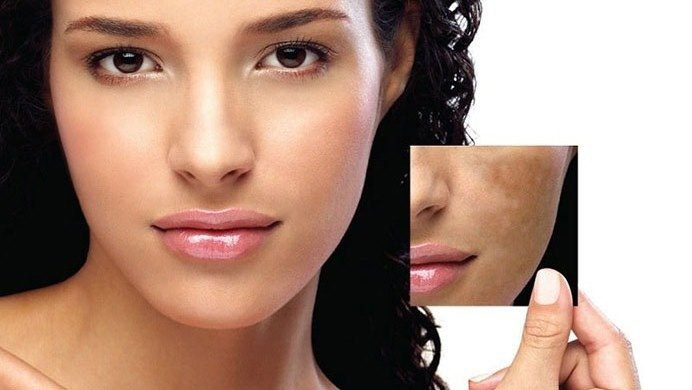We all desire smooth, perfect skin, but differences in individual constitution, living, and working environments lead to uneven skin tone, which can cause dark spots or patches on the skin. So, what solutions help uneven skin tone?
1. Causes of uneven skin tone
Uneven skin tone refers to the presence of areas of skin with different colors across the body. Uneven skin tone is fundamentally an increase in pigmentation, primarily involving excessive production of melanin. When the natural skin pigments become excessively high, they create darker areas of skin compared to others. Although it does not affect health, individuals with uneven skin tone may feel less confident about their appearance.
Some common causes of uneven skin tone include:
- Direct exposure to sunlight for prolonged periods: This is one of the leading causes of uneven skin tone. When exposed to high levels of UV rays from sunlight, skin cells produce more melanin, acting as a protective shield for the skin. The more melanin is produced, the higher the risk of developing differently colored skin areas.
- Air pollution: Invisible particles suspended in the air such as smoke, dust, chemicals, carbon dioxide, etc. can penetrate the pores of the skin, stimulating the body’s natural immune system to operate and produce a large amount of melanin to protect the skin, resulting in uneven skin tone.
- Dermatitis: Acne or lesions that create open wounds on the skin can lead to dermatitis. Once again, the body’s natural immune system activates, producing melanin to protect the skin from bacterial attacks and other harmful agents. This results in uneven skin color.
- Hormonal changes: Changes in hormones often occur in cases of women who are pregnant or entering perimenopause. The variation in concentration and function of hormones stimulates the body to produce melanin. This explains why women aged 50 and above often have many age spots on all areas of the skin.
2. How to remedy uneven skin tone
2.1. Remedy uneven skin tone by changing lifestyle habits.
- Moisturizing the skin: This is one of the top recommended effective measures by dermatologists to protect the skin, especially for dry skin. Use moisturizers suitable for each skin type to soothe, minimize dryness, redness, clogged pores, and skin irritation. Don’t forget to hydrate all areas of the body, not just the face. Using a moisturizer can help prevent the appearance of dark patches and age spots over time.
- Using sunscreen regularly to prevent the harmful effects of UV rays from sunlight. This not only helps limit redness and peeling but can also slow down the appearance of age spots. Apply sunscreen whenever going outside in hot weather and choose a suitable product to avoid irritation while providing effective UV protection.
- Avoiding certain foods and beverages: Snacks, alcohol, and high-sugar foods can accelerate the appearance of wrinkles and age spots. Fatty foods are not beneficial for the skin.
2.2. Treating uneven skin tone with natural source products.
- Vitamin C: Vitamin C has the ability to combat oxidation, helping to neutralize free radicals, slow down the aging process, and improve skin tone. Foods rich in vitamin C include: oranges, guavas, peppers, kiwifruit, strawberries…
- Niacin: A nutrient essential for the health of skin, hair, and nails. Niacin helps restore uneven skin tone, reduce wrinkles, and make the skin healthier through a mechanism similar to that of vitamin C by neutralizing the body’s free radicals. Foods high in niacin include: poultry, green beans, mushrooms, tuna…
- Lemon juice: Lemon juice can be used as an effective makeup remover and skin whitener. Applying lemon juice to darkened areas of the skin can yield surprising results.
- Witch hazel extract: Gentle on the skin, it has anti-inflammatory properties that reduce irritation and redness. Witch hazel extract can be applied directly to the skin or added to products such as moisturizers, bath soaps, etc.
- Rose: Roses have long been a symbol of femininity. This is not just a poetic metaphor; in reality, rose water has the ability to beautify the skin, reduce uneven skin tone, and prevent the appearance of wrinkles. Rose water fights against oxidation, promotes skin cells to produce collagen, making the skin brighter, healthier, and smoother.
- Kojic Acid: Found in many skin care products due to its strong antioxidant properties.
- Glycolic acid: Besides its effects on treating acne, scars, dark spots, etc., glycolic acid also helps reduce uneven skin tone.
- Salicylic acid: An essential ingredient in many skincare creams. Salicylic acid helps exfoliate, remove damaged skin cells, and is effective in treating acne, dark scars, and discoloration.
2.3. Treatment for uneven skin tone
- 4% hydroquinone: A topical medication used to apply to discolored areas of skin twice a day to lighten dark spots. During treatment with 4% hydroquinone, regular monitoring is necessary, and use should be stopped immediately if any signs of irritation or dermatitis are observed.
- Laser treatment: A method being used to improve skin tone, lighten skin, and fade dark scars. However, this method is not recommended due to numerous side effects that can affect the health of the user.
- Chemical peel: With three levels: light, medium, deep. Chemical peels work based on the application of chemical solutions to the skin to exfoliate dead skin cells, revealing fresh, healthy skin underneath.
- Makeup: A quick solution that helps users regain confidence in communication by using powder, foundation, and moisturizer that matches their skin tone. However, this is not a radical treatment for uneven skin tone.

